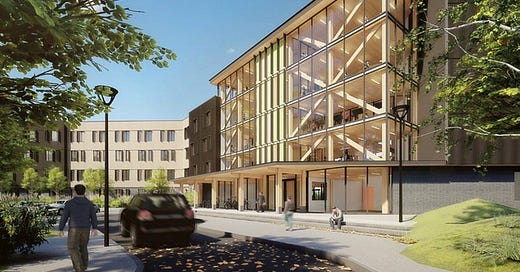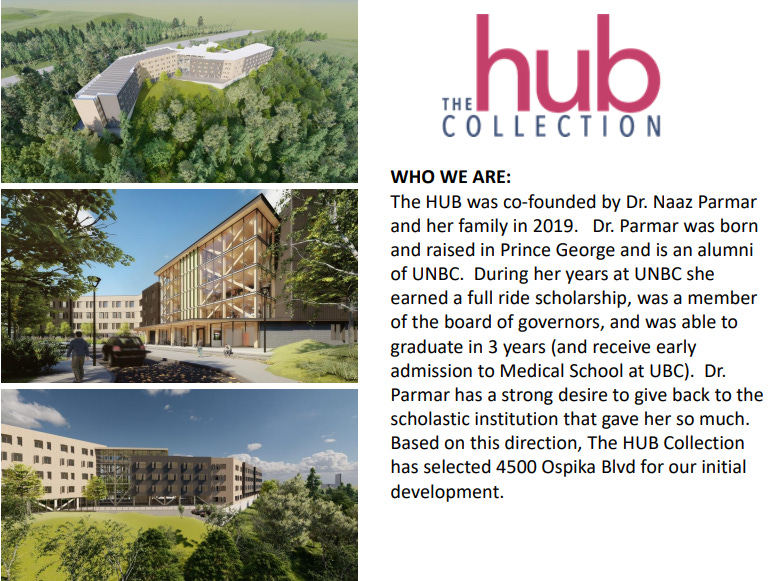The city is open for business but don't go back on the deal
And old wounds reopen over decision-making at city hall
Before last night’s council meeting started, a press release went out from the group “Ginter’s Green Forever” which has established itself as something of a development watchdog. Here’s the release:
On Monday, City Council will vote to potentially hand a windfall asset appreciation to a private developer on the backs of the public and our greenspace.
When the nearly 14 acre lot of city land at 4500 Ospika Boulevard was sold in July of 2020 for $500,000 to Hub Collection, or $36,000 an acre, strict requirements were put in place requiring 256 units of student housing within 24 months. Failure to do so included the city’s right to repossess the land for $485,000.
Now, 30 months later, the greenspace has been bulldozed, the assessed value of the land is now worth $3.55 million, and still no student housing has been initiated.Instead, city staff is recommending we remove the requirement for 256 units of student housing, and to allow the construction of a 128 unit development “intended” for seniors housing, with no requirements in the proposed modified covenant to do so.
“When we lose public land, especially in an ecologically important piece of greenspace like on the escarpment, we should be getting a lot more value for that land,” said Jenn Matthews of Ginter’s Green.
“When you sell public land below market value, you can only legally do that if the public gets something in return,” said James Steidle of Ginter’s Green Forever. “We need to have a boiler-plate guarantee that the public will get non-market housing in this new deal equivalent to the hit the public has taken in this bargain-basement sale.”
“The assessed value has climbed over $3 million dollars since the time of this sale, which represents a 710% return on investment while students are still struggling to find affordable housing,” said Susanne Weber of Ginter’s Green Forever.
”Our city needs to prioritize development in the urban core and respect greenspace. The public should not lose greenspace and millions of dollars in property value to make some Vancouver developer happy,” said Jenn Matthews.
A bit of backstory: A 256-unit student housing building in the University Heights neighbourhood was first proposed publicly back in March 2021. By June it had received the support of city council, despite some neighbourhood opposition, precisely because of what it offered: high density, affordable student housing in a post-secondary neighbourhood that would make UNBC accessible by those living there without a car — something planning documents indicate is needed. And, it did look pretty cool: Sleek and urban and surrounded by forest.
But there were also problems. In May 2021 the Citizen reported the developers had actually wanted to build closer to downtown but were redirected to University Heights by the city, who also sold the the land in June 2020 for below-market value. And while part of the deal was that Hub actually build a 256-unit student housing within two years, by last fall it became clear that not only was that building nowhere near done, but also the proposal was now for a 128-unit housing complex “oriented toward” senior’s, rather than student, housing.
Which brings us to yesterday: Because the developers wanted to change the terms of the agreement, city staff decided to go to council to get their advice (more on this later). And that’s what prompted the news release that kicked off this letter.
Defending city staff
The first person to speak about this agenda item was Kyle Sampson. Pretty quickly he rattled through some matters of procedure in an effort to explain both what was going on but also give some defence to city staff who might be criticized for how this went about.
Firstly, he wanted clarity: When city staff bring a proposal like this to the table, they aren’t endorsing it or not based on whether they think it’s a good idea, personally. It’s based on how it fits into the city’s community plan and strategic goals, right? Staff answered, yes. The translation being — when city staff say they recommend the city approve seniors housing on this lot it’s not because they think it’s a good idea to let a company change the deal. It’s because there is an identified need for seniors housing in the city, and this lot is zoned for development. It’s up to council to decide the nuances of whether this is an overall good idea.
The next thing Sampson wanted to make clear was how the lot went from an assessed value of just over half-a-million to more than $3 million in a matter of years. Well, that’s in part because back before the land was sold, it was undeveloped, unsold city land. Once it was sold and zoned for a multi-unit student housing development, that made the value go up. It’s not that the city was being dumb and selling valuable land for cheap, it’s that it was taking cheap land and making it valuable by working with a developers.
And with that out of the way, Sampson put a motion on the table: Turn the developer’s senior housing proposal down.
“We sold the lands for a specific purpose, we made a deal with the developer that this was what was going to built there, and that’s what I expect to be built there,” he said.
There was a competition between councillors Garth Frizzell and Brian Skakun to second the motion, with Frizzell winning and largely echoing Sampson’s remarks, clarifying that while the city is open for business and will work with developers, he doesn’t want to see this project changed.
Everyone else agreed: Tim Bennett said while there’s a need for senior’s housing, too, it doesn’t make sense to put it up in University Heights away from medical services and other needs. Cori Ramsay and Susan Scott said much the same — senior’s housing is a great idea, but not here. University Heights should have students living there, Ramsay said. The change was denied, but now that the Hub has taken down its showy website it’ll be interesting to see if they actually build something they don’t want to build anymore. The Citizen couldn’t reach them for comment.
But there was more to the discussion than just this.
‘When you’ve been bitten by a snake, all ropes look suspicious’
During the discussion about this deal with the city, coun. Brian Skakun started to ask questions about the deal the city made with Hub in the first place, saying the first he’d heard of it was when he read about in the Citizen. While Sampson said that’s not entirely true, as it had come up in a previous meeting, it was established that the details of the deal had not been shared with city council until now. And the reasons for this are something called delegated authority.
Basically, it works like this: While it is up to mayor and council to make decisions about how to run the city, it would be madness to have them debating on voting on every little thing that came their way. It would result in long delays for fairly minor decisions, and so they focus on high-level items while city staff have the power to make day-to-day decisions. What’s tricky is deciding what’s high-level enough to need council approval and what’s small enough that it need not be put off for a council vote.
Delegated authority really became an issue during the infamous downtown parkade debacle. Basically, as I reported here, as this project went further and further over budget, it never went to council because it fell into the purview of the then-city-manager’s delagated authority to approve a few thousand here, a few thousand there, until the costs skyrocketed into a full blown scandal without council or the public finding out until months later. In fact, her annual delegated authority budget was $7 million, an amount an independent legal review of the matter found “troubling” and which has since been significantly reduced.
Anyways, with all that in mind Skakun wanted to know why council hadn’t been brought in on this matter before and why they were being brought in now. He was informed that technically, staff could have gone ahead and made a decision about whether to approve the change in project scope without going to council, but staff have decided to be more proactive about this sort of thing.
Which — is all well and good — but deciding to be proactive about going to council and being required to be proactive about going to council are two different things. The previous city manager could have decided to be proactive when parkade costs started piling up, but didn’t, and some future staffer could decide there is no need to be proactive about telling council (and the public!) about it when a developer who entered into an agreement with the city to build student housing decides to make it senior’s housing, instead, and reduce the number of units going forward. On the other hand, as Cori Ramsay pointed out, she’s been in council for more than four years now and this is the first time there’s been a problem with this sort of project — and there are a lof of them — so again, requiring everything to go to council could be a poor use of time/taxpayer dollars, as well. There’s no magic formula! But you can imagine why council would be a little wary of the idea of any high-profile development deals changing scope without them knowing about it. As Mayor Simon Yu put it later in the night when discussing another matter of delegated authority “When you’ve been bitten by a snake, all ropes look suspicious.”
Other news:
Northern Capital News is a free, daily newsletter about life in Prince George. Please consider subscribing or, if you have, sharing with someone else.
Send feedback by replying to this email. Follow me online @mstdn.ca/@akurjata.







So it seems like to me that city staff wouldn't have the power to change this convent without council's approval, but that is exactly what they said at the meeting last night.
6.1 + 6.2 of these bylaws.... seems that power is limited to properties valued under 100 000??
I think we all need to follow up on this.
https://l.facebook.com/l.php?u=https%3A%2F%2Fbylaws.princegeorge.ca%2FModules%2Fbylaws%2FBylaw%2FDownload%2FA6A859C9-403C-4F5C-AA14-21F7CBB5B9C0%3Ffbclid%3DIwAR3Lmjl8BzJm4UCY0xNYl33rfXAgBuiKvht4t8Lz12cFbz18DgYKmOa2AyU&h=AT2WsIFAy4wmjIOlpp-vPz5OQ7gAM2qk-BAV5pdAJubH12n_1NqBzi0HERsTYG5n2TZiUwK5AKJBMjOBvy1xKbFdSxbUhDfzua6Vtduar9udcZ076FbDX3c_rctwf1T2b1bDKvUO6QnxNmZLThhd3cy7